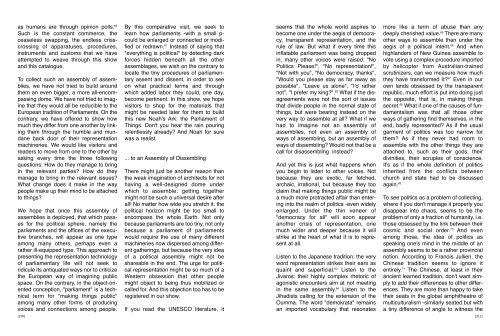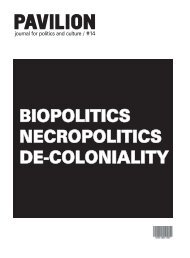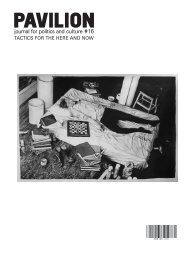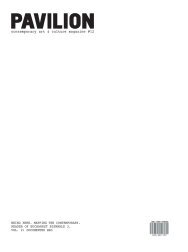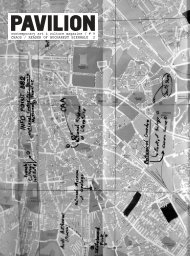PAVILION
PAVILION
PAVILION
- No tags were found...
You also want an ePaper? Increase the reach of your titles
YUMPU automatically turns print PDFs into web optimized ePapers that Google loves.
as humans are through opinion polls. 60<br />
Such is the constant commerce, the<br />
ceaseless swapping, the endless crisscrossing<br />
of apparatuses, procedures,<br />
instruments and customs that we have<br />
attempted to weave through this show<br />
and this catalogue.<br />
To collect such an assembly of assemblies,<br />
we have not tried to build around<br />
them an even bigger, a more all-encompassing<br />
dome. We have not tried to imagine<br />
that they would all be reducible to the<br />
European tradition of Parliaments. On the<br />
contrary, we have offered to show how<br />
much they differ from one another by linking<br />
them through the humble and mundane<br />
back door of their representation<br />
machineries. We would like visitors and<br />
readers to move from one to the other by<br />
asking every time the three following<br />
questions: How do they manage to bring<br />
in the relevant parties? How do they<br />
manage to bring in the relevant issues?<br />
What change does it make in the way<br />
people make up their mind to be attached<br />
to things?<br />
We hope that once this assembly of<br />
assemblies is deployed, that which passes<br />
for the political sphere, namely the<br />
parliaments and the offices of the executive<br />
branches, will appear as one type<br />
among many others, perhaps even a<br />
rather ill-equipped type. This approach to<br />
presenting the representation technology<br />
of parliamentary life will not seek to<br />
ridicule its antiquated ways nor to criticize<br />
the European way of imagining public<br />
space. On the contrary, in the object-oriented<br />
conception, "parliament" is a technical<br />
term for "making things public"<br />
among many other forms of producing<br />
voices and connections among people.<br />
By this comparative visit, we seek to<br />
learn how parliaments -with a small p-<br />
could be enlarged or connected or modified<br />
or redrawn. 61 Instead of saying that<br />
"everything is political" by detecting dark<br />
forces hidden beneath all the other<br />
assemblages, we wish on the contrary to<br />
locate the tiny procedures of parliamentary<br />
assent and dissent, in order to see<br />
on what practical terms and through<br />
which added labor they could, one day,<br />
become pertinent. In this show, we hope<br />
visitors to shop for the materials that<br />
might be needed later for them to build<br />
this new Noah's Ark: the Parliament of<br />
Things. Don't you hear the rain pouring<br />
relentlessly already? And Noah for sure<br />
was a realist.<br />
... to an Assembly of Dissembling<br />
There might just be another reason than<br />
the weak imagination of architects for not<br />
having a well-designed dome under<br />
which to assemble: getting together<br />
might not be such a universal desire after<br />
all! No matter how wide you stretch it, the<br />
political horizon might be too small to<br />
encompass the whole Earth. Not only<br />
because parliaments are too tiny, not only<br />
because a parliament of parliaments<br />
would require the use of many different<br />
machineries now dispersed among different<br />
gatherings, but because the very idea<br />
of a political assembly might not be<br />
shareable in the end. The urge for political<br />
representation might be so much of a<br />
Western obsession that other people<br />
might object to being thus mobilized or<br />
called for. And this objection too has to be<br />
registered in our show.<br />
If you read the UNESCO literature, it<br />
seems that the whole world aspires to<br />
become one under the aegis of democracy,<br />
transparent representation, and the<br />
rule of law. But what if every time this<br />
inflatable parliament was being dropped<br />
in, many other voices were raised: "No<br />
Politics Please!", "No representation!",<br />
"Not with you", "No democracy, thanks",<br />
"Would you please stay as far away as<br />
possible", "Leave us alone", "I'd rather<br />
not", "I prefer my king?". 62 What if the disagreements<br />
were not the sort of issues<br />
that divide people in the normal state of<br />
things, but were bearing instead on the<br />
very way to assemble at all? What if we<br />
had to imagine not an assembly of<br />
assemblies, not even an assembly of<br />
ways of assembling, but an assembly of<br />
ways of dissembling? Would not that be a<br />
call for disassembling instead?<br />
And yet this is just what happens when<br />
you begin to listen to other voices. Not<br />
because they are exotic, far fetched,<br />
archaic, irrational, but because they too<br />
claim that making things public might be<br />
a much more protracted affair than entering<br />
into the realm of politics -even widely<br />
enlarged. Under the thin veneer of<br />
"democracy for all" will soon appear<br />
another crisis of representation, one<br />
much wider and deeper because it will<br />
strike at the heart of what it is to represent<br />
at all.<br />
Listen to the Japanese tradition: the very<br />
word representation strikes their ears as<br />
quaint and superficial. 63 Listen to the<br />
Jivaros: their highly complex rhetoric of<br />
agonistic encounters aim at not meeting<br />
in the same assembly. 64 Listen to the<br />
Jihadists calling for the extension of the<br />
Oumma. The word "demokrata" remains<br />
an imported vocabulary that resonates<br />
more like a term of abuse than any<br />
deeply cherished value. 65 There are many<br />
other ways to assemble than under the<br />
aegis of a political intent. 66 And when<br />
highlanders of New Guinea assemble to<br />
vote using a complex procedure imported<br />
by helicopter from Australian-trained<br />
scrutinizers, can we measure how much<br />
they have transformed it? 67 Even in our<br />
own lands obsessed by the transparent<br />
republic, much effort is put into doing just<br />
the opposite, that is, in making things<br />
secret. 68 What if one of the causes of fundamentalism<br />
was that all those other<br />
ways of gathering find themselves, in the<br />
end, badly represented? As if the usual<br />
garment of politics was too narrow for<br />
them? As if they never had room to<br />
assemble with the other things they are<br />
attached to, such as their gods, their<br />
divinities, their scruples of conscience.<br />
It's as if the whole definition of politics<br />
inherited from the conflicts between<br />
church and state had to be discussed<br />
again. 69<br />
To see politics as a problem of collecting,<br />
where if you don't manage it properly you<br />
disappear into chaos, seems to be the<br />
problem of only a fraction of humanity, i.e.<br />
those obsessed by the link between their<br />
cosmic and social order. 70 And even<br />
among those, the idea of politics as<br />
speaking one's mind in the middle of an<br />
assembly seems to be a rather provincial<br />
notion. According to Franois Jullien, the<br />
Chinese tradition seems to ignore it<br />
entirely. 71 The Chinese, at least in their<br />
ancient learned tradition, don't want simply<br />
to add their differences to other differences.<br />
They are more than happy to take<br />
their seats in the global amphitheatre of<br />
multiculturalism -similarly seated but with<br />
a tiny difference of angle to witness the<br />
[210]<br />
[211]


